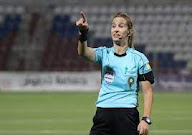Switzerland – Netherlands
Referee: Iuliana Demetrescu (ROU, photo)
Assistant Referee 1: Petruta Iugulescu (ROU)
Assistant Referee 2: Anita Vad (HUN)
Fourth Official: Lorraine Watson (SCO)
VAR: Maurizio Mariani (ITA)
AVAR: Paolo Valeri (ITA)
Referee Observer: Katarzyna Wierzbowska (POL)
Sweden – Portugal
Referee: Stephanie Frappart (FRA)
Assistant Referee 1: Elodie Coppola (FRA)
Assistant Referee 2: Manuela Nicolosi (FRA)
Fourth Official: Kateryna Monzul (UKR)
VAR: Tomasz Kwiatkowski (POL)
AVAR: Bartosz Frankowski (POL)
Referee Observer: Blaženka Logarušić (CRO)
Referee: Jana Adamkova (CZE)
Assistant Referee 1: Lucie Ratajova (CZE)
Assistant Referee 2: Maria Sukenikova (CZE)
Fourth Official: Lorraine Watson (SCO)
VAR: Tiago Martins (POR)
AVAR: Christopher Kavanagh (ENG)
Referee Observer: Blaženka Logarušić (CRO)
Referee: Iuliana Demetrescu (ROU, photo)
Assistant Referee 1: Petruta Iugulescu (ROU)
Assistant Referee 2: Anita Vad (HUN)
Fourth Official: Lorraine Watson (SCO)
VAR: Maurizio Mariani (ITA)
AVAR: Paolo Valeri (ITA)
Referee Observer: Katarzyna Wierzbowska (POL)
Sweden – Portugal
Referee: Stephanie Frappart (FRA)
Assistant Referee 1: Elodie Coppola (FRA)
Assistant Referee 2: Manuela Nicolosi (FRA)
Fourth Official: Kateryna Monzul (UKR)
VAR: Tomasz Kwiatkowski (POL)
AVAR: Bartosz Frankowski (POL)
Referee Observer: Blaženka Logarušić (CRO)
18 July 2022
Iceland - FranceReferee: Jana Adamkova (CZE)
Assistant Referee 1: Lucie Ratajova (CZE)
Assistant Referee 2: Maria Sukenikova (CZE)
Fourth Official: Lorraine Watson (SCO)
VAR: Tiago Martins (POR)
AVAR: Christopher Kavanagh (ENG)
Referee Observer: Blaženka Logarušić (CRO)
Italy – Belgium
Referee: Ivana Martinčić (CRO)
Assistant Referee 1: Sanja Rodjak-Karšić (CRO)
Assistant Referee 2: Staša Špur (SVN)
Fourth Official: Ivana Projkovska (MKD)
VAR: Pol van Boekel (NED)
AVAR: Dennis Higler (NED)
Referee Observer: Katarzyna Wierzbowska (POL)
















